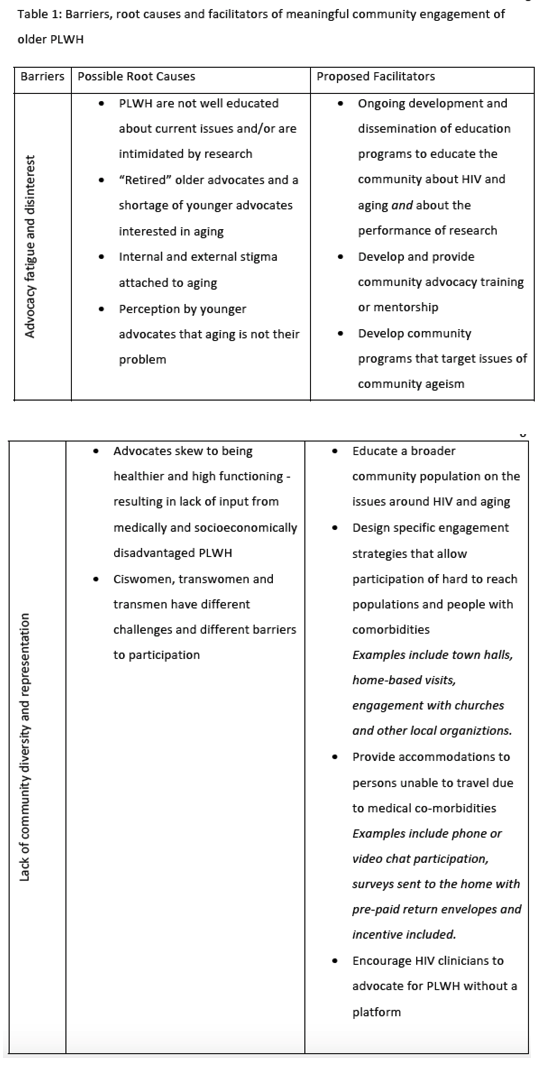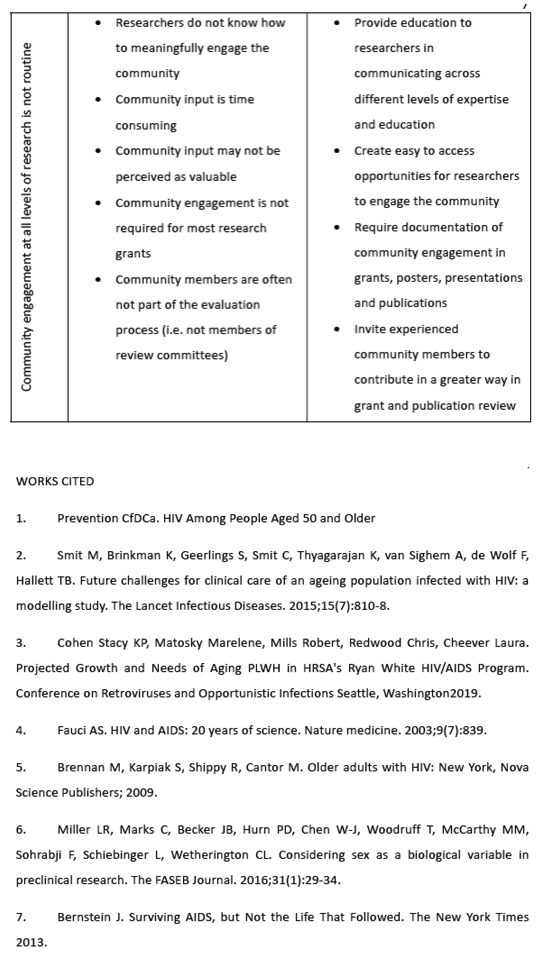 |
 |
 |
| |
Perspectives from the Front Lines: Encouraging Community
Engagement in the Performance of Research at the Intersection of
HIV and Aging
|
| |
| |
Download the PDF here
"........Notable examples directly catalyzed by PLWH accelerated access to ART, studies evaluating combination therapy (no previous precedent at the FDA), and research on ART adverse effects(4). However, the hopefulness that community members experienced from those monumental successes has faded.
.......In this letter, we advocate for the implementation of
community engagement from preconception to study implementation, data interpretation and dissemination in HIV and aging research.....
.....Older adults dominate the current epidemic; many feel abandoned by the community, providers, researchers, and healthcare institutions and some fear that change will come too late for them...... In this letter, we advocate for the implementation of
community engagement from preconception to study implementation, data interpretation and dissemination in HIV and aging research......many older PLWH do not have a platform as they are too frail, sick, mentally and physically impaired or disabled and are the "new silent majority"."
ACKNOWLEDGEMENTS:
In memory of Spencer Cox and the numerous other community members who, suffering
and feeling abandoned, chose death over life(7).
see these in tables below
"Lack of community diversity and representation
• Provide accommodations to persons unable to travel due to medical co‐morbidities
Examples include phone or video chat participation, surveys sent to the home with
pre‐paid return envelopes and incentive included.
• Encourage HIV clinicians to advocate for PLWH without a platform"
"Community engagement at all levels of research is not routine
• Researchers do not know how to meaningfully engage the community
• Community input is time consuming
• Community input may not be perceived as valuable
• Community engagement is not required for most research grants
• Community members are often not part of the evaluation process (i.e. not members of review committees)"
Maile Y Karris1, Dorcas Baker2*, Jeffrey Berry3*, Brandon Brown4, Stephen Karpiak5*, Jules Levin6*, Melanie Reese7*, Matthew Sharp8*, and Jeff Taylor9*
1Department of Medicine, University of California San Diego, San Diego, California. School of Nursing, 2John Hopkins University, Baltimore, Marlyand. 3Test Positive Aware Network, Chicago, Illinois. 4Department of Social Medicine and Population Health, University of Riverside, Riverside, California. 5AIDS Community Research Initiative of America, New York, New York. 6National AIDS Treatment Advocacy Project, New York, New York. 7Older Women Embracing Life, Baltimore, Maryland. 8The Reunion Project, Berkeley, California. 9HIV + Aging Research Project – Palm Springs, Palm Springs, California, *indicates PLWH and/or long‐time community advocate activist.
Corresponding Author
Maile Young Karris, M.D.
Associate Professor of Medicine
Divisions of Infectious Diseases & Global Public Health and Geriatrics & Gerontology
220 Dickinson Street
San Diego, CA 92103
Email: m1young"at"ucsd.edu
The devastating losses of the early AIDS epidemic fueled an urgency and purpose that led to historic collaborations between people living with HIV (PLWH), HIV clinicians and researchers. This unprecedented effort led to significant advances best manifested by the rapid development and testing of highly effective antiretroviral treatments (ART) for HIV/AIDS. ART saved lives and is the primary reason we have an epidemic dominated by older PLWH. U.S. statistics from 2015 demonstrate that 38% (171,172) of PLWH were aged 50‐54, 29% (131,430) were 55‐59, 18% (81,438) were 60‐64 and 16% (70,644) were 65 years and older(1). Current estimates suggest that by 2030 64‐73% of PLWH will be aged 50 years or older(2)(3). Notable examples directly catalyzed by PLWH (i.e. the community based advocacy group ACT UP) include accelerated access to ART, studies evaluating combination therapy (no previous precedent at the FDA), and research on ART adverse effects(4). However, the hopefulness that community members experienced from those monumental successes has faded.
Given the history and effectiveness of community partnerships, researchers at the intersection of HIV and aging should be eliciting and embracing community input. Yet, a gap persists between the needs that older PLWH voice (what will happen to me when I cannot care for myself, I'm waiting to die) and the research being pursued(5). HIV research institutions do invite community stakeholders to the table but involvement is often superficial leaving advocates feeling unheard, unvalued, and fearful that the answers to their research priorities will not come in their lifetime.
Specific examples generated by the authors who consist of PLWH and researchers include: 1) development of novel and innovative strategies of HIV care and support services that purposefully address aging needs, 2) studies that focus on quality as well as length of life and address factors that negatively impact aging (i.e. depression, isolation, substance use, etc.), and 3) the long term effects of ART in older adults. Additionally, many older PLWH do not have a platform as they are too frail, sick, mentally and physically impaired or disabled and are the "new silent majority".
Challenges exist to improving community collaboration in research, but they are not insurmountable (Table 1). In this letter, we advocate for the implementation of community engagement from preconception to study implementation, data interpretation and dissemination in HIV and aging research. This will represent a change in the current research culture and practice but it is the authors' collective opinion this is worth the time and effort. As was the case for inclusion of sex as a biologic variable, we expect this change will only come if required(6). Thus, we challenge funders, publishers and conference organizers to not only ask researchers in the fields of HIV and geriatrics/gerontology to thank community participants in presentations and publications but require documentation of community engagement throughout the research process. We believe these practices will lead to meaningful community engagement in the leadership of groups that fund and conduct research, in the committees that approve research and ultimately result in broad and innovative advances in the science and care of older PLWH. Older adults dominate the current epidemic; many feel abandoned by the community, providers, researchers, and healthcare institutions and some fear that change will come too late for them.


|
| |
|
 |
 |
|
|